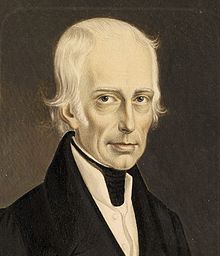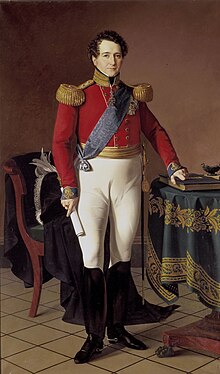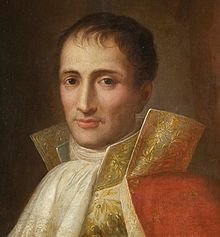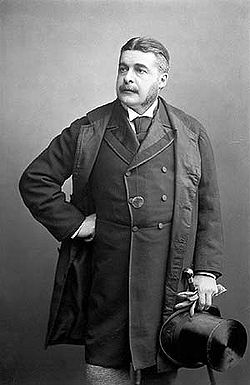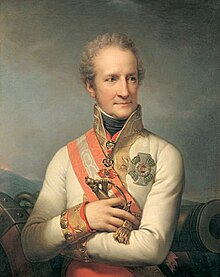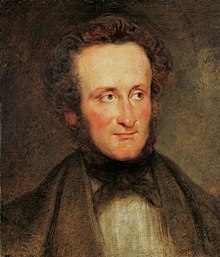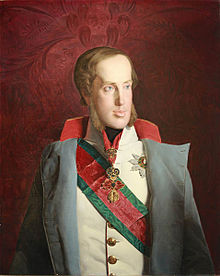CHAPTER 23
SUCCESSION CRISIS IN AUSTRIA AND THE LOUISIANA PURCHASE
Kaiser Franz
Following the dramatic events of 1835, Europe was waiting for the next "old-time" leader to pass away. Franz of Austria was in terrible health at age 67 and was expected to die any time. King Friedrich Wilhelm III of Prussia had suffered a fall from his horse in 1834, and had been in declining condition since, even though he was only 65. His Wettin wife Maria of Saxony was only 53, but suffering hugely from the effects of increasing obesity. Many leaders of the "Napoleonic Generation" were in bad health. It was no surprise when the harsh winter and following spring of 1835-36 finally brought the Grim Reaper to the Royal Houses of Europe.
Frederick VI of the Kingdom of Denmark-Norway
(January 28th, 1768 - November 4th, 1835)
King Frederick VI of Denmark-Norway and the House of Oldenburg was to go down in history as a good monarch. He had been on the winning side of the Great Wars of the Empire, supporting Caesar Napoleon I, despite the fact that he was King George III's nephew. He was actually in good health until the day he died, aged 67, in Copenhagen of unknown causes (though he had been complaining of chest pains). His death didn't cause a news storm like Napoleon I's, but his funeral was attended by a large amount of Europe's leaders. The childless king's throne passed to his cousin, Christian Frederik, who became King Christian VIII.
King Christian VIII of Denmark-Norway
Joseph I of the Kingdom of Ireland
(January 7th, 1768 - January 9th, 1836)
Joseph Bonaparte was a man who would go down as having ridden his entire life on his younger brother's coattails. Without Napoleon, he would have been nothing. Instead, at his death he had been king of two different nations, had a son waiting to be King of Ireland and a daughter on the Sicilian throne. He died of pneumonia two days after his 68th birthday. The funeral was attended by most of the French Imperial government and a few international leaders. Caesar Napoleon II bestowed many posthumous medals to Joseph's wife Julie at a ceremony in central Dublin. Joseph's only son Dominique (age 38) took the throne two weeks later as Dominic I of Ireland. Dominic was married to a German countess from the Rheinbund by this point, and already had two children, Crown Prince Dominic Joseph Napoleon Bonaparte and Mary Julie Napoleona Bonaparte.
Later photograph (1850s) of King Dominic I of Ireland
Prince Johann I of Liechtenstein
(June 26th, 1760 - February 3rd, 1836)
Johann I was the last Holy Roman Prince of Liechtenstein, but he remained loyal to his native Austria until his death death at age 76. Aside from an exciting career in the Wars of the Empire, his life was unremarkable. One thing he was known for was his disgust at the dissolution of the Holy Roman Empire and protested the growing friendship between France and Austria. He was buried in the Imperial Crypts of Vienna and was immediately succeeded by his son Aloys II.
Prince Aloys II of Liechtenstein
Franz I of the Austrian Empire
(February 12th, 1768 - March 22nd, 1836)
The death of Franz I on March 22nd, 1836, at age 68, jolted Europe. No one was surprised; they had expected his death due to declining health for over a year. But now that he had passed, it finally soaked in just how monumental his death was. He was the last man to hold the title of Holy Roman Emperor, he was one of the last leaders alive who had opposed Napoleon, and he was the first leader to host a World Congress.
For years, there had been rumors among the Austrian court that the severely mentally handicapped Prince Ferdinand would lose his claim to the throne. Normally, this would mean that the next male in the line of succession would automatically receive the crown--in this case, the next male was Archduke Franz Karl.
However, what was shocking was the increasing hold French Dowager Caesarina Marie Louise had on Kaiser Franz. He had been prematurely senile for several years, a condition made worse by his quack staff of medical "experts," and during that time his daughter pumped all kinds of ideas into him about her son, Napoleon II. Franz had always been fond of "L'Aiglon," but when he started hinting that he might just
give the Austrian throne to his grandson, who also happened to be the son of his former mortal Corsican enemy, there began to be talk of a
coup d'etat in Vienna. Young Franz Karl was gathering his supporters in both the government and the army in case his father's will said anything that smacked of his Francophile sister's involvement. When Franz finally died, all the world held its breath as the will was opened. The document formally offered the Imperial Crown of Austria, Hungary, and all associated kingdoms and lands to Napoleon II of the French. Franz Karl
raged and left Vienna accompanied by his personal troops. Austria braced itself for civil war.
Now this is where things got really interesting and
very dangerous. In late April, as news swept North America of the seemingly certain civil war between Austria and the Empire, civil unrest erupted in the Louisiana territory. To understand this turn of events, one has to look back at the last two decades prior to this time in history. The Republican Union had long been leaking settlers across the Mississippi. Many claimed huge swathes of territory as their own and AFC churches dotted the land. The first of these illegal "expeditions of exploration" into French Louisiana was led by one of Willard Crawford's right hand men during the Collapse of the Old Republic.
A hero of the Pacification of Rhode Island, Major Meriwether Lewis was actually a native-born Virginian, but he remained in the north after the Collapse of the Old Republic because of his personal loyalty to Crawford as well as wishing to see a new United States rise anew from the ashes. He was an early follower of the Prophet Burr and saw the Mad Preacher's vision of a united empire stretching coast to coast as a heavenly prophecy. Lewis also fought bravely during the War of 1812 and even led the unit Charles Goodyear's father Amasa died fighting in. In the 1820s, he began leading the expeditions out west to explore Louisiana, with the first true Yankee settlement in Louisiana being founded by him in 1825, originally named Sioux Falls. After Anglo-Saxon purism took deeper hold within the community, the town was renamed to Praise and they built the first true AFC church outside of the Republican Union.
Ever since, France had been enraged at this growing encroachment onto their territory and wanted the Americans expelled. This resulted in the 1833 Sioux-Praise War, which saw the regional capital of the American settlers viciously attacked by native Sioux tribes funded by the French. Much to the chagrin of the French, the settlers engaged in a massive genocidal holy war against the tribes instead, purging the once great Sioux Nation out of the Dakota region. They saw the Anglo-Saxon white man as virtually a god compared to the "Frenchified Red Savages." The unbelievable atrocities committed by both sides ended up simply chasing out the actual French settlers from the region leaving it wide open for more American meddling. Also, Iturbide, the Mad Emperor of Mexico, was still waging his bloody war of attrition against Georgia and Texas. All in all, almost no French people wanted to settle Louisiana because of its general mayhem and bloody conflicts.
The conflict was close to potentially erupting into a Union-French War when the Austrian Emperor died and the Second War of Austrian Succession loomed heavy on the horizon of Europe. Suddenly, the focus of the French public shifted from American villainy to Austrian doubting of their beloved Caesar's right to rule lands bequeathed to him by Kaiser Franz himself. Napoleon II knew he had to deal with Austria swiftly and immediately and focus all of his power upon it. This meant a conclusion of the Louisiana Crisis had to be achieved. Reluctantly, in mid-1836, as Franz Karl gathered his armies and the French and Spanish troops prepared for war, Union ambassadors led by Meriwether Lewis arrived to negotiate a "final peace in our time" over the Louisiana issue. In exchange for the Union entering the war against Mexico, they would receive almost the entirety of the Louisiana territory for the sum of 50 million RU Dollars. However, the southern half was to be sold to the Republic of Georgia, including the all-important New Orleans. The Union diplomats demanded this portion as well, but eventually agreed to the deal after France's price went down to 40 million dollars and guaranteed neutrality of the Mississippi River. America would quickly come to hate this deal, as the flow of America trade that was supposed to be free and guaranteed open travel was still restricted by the patrolling Georgian gunboats. This would later lead to many more problems. Even Georgia was now less pro-French, as they had seen the sale of Louisiana as a slight against their sovereignty and as bowing down to Philadelphia.
Back in Europe, just as things appeared to be coming to a breaking point, Franz Karl extended a hand to Napoleon II to come visit him in Vienna to try one last time to sort things out. Miraculously, they did, and the Second Treaty of Vienna was signed on September 10, 1836.
Main Articles of the Second Treaty of Vienna (1836)
- That Napoleon II of the Empire of France and its associated governments does henceforth negate all claims to the Crown of Austria.
- That the Empire of Austria officially become the Empire of Austria-Hungary.
- That said Empire of Austria-Hungary be ruled by Franz Karl, as Kaiser Franz Karl I, and that it will be in an inseparable, permanent alliance with the French Empire.
- That the aforementioned Napoleon II and Franz Karl I arrange for a later marriage of their children, an Austrian girl to a French boy, providing for ultimate dynastic union.
- That future expeditions into China and the Far East be jointly undertaken by the Empires of France and Austria-Hungary.
- That the Austro-Hungarian Army may never attempt military offenses or declare war without the approval of its ally the Empire of France and vice versa.
These terms, some said, essentially amounted to France taking away Austria's self-rule. But, to the businessman-like Franz Karl, they were acceptable. It was one thing for a born-and-bred Frenchman to take the Austrian crown, he said, but another thing to have a legitimate and agreed-upon half-Austrian, half-French heir take it. Thus, a catastrophic European civil war was avoided. However, Napoleon II, already having cracked down on "anarchy" before with ruthless efficiency, decided that the Louisiana Accords and the Second Treaty of Vienna made him look weak. He decided that if another potential conflict arose he would have to act immediately to show that his Empire would still rule the world and crush its enemies in battle.
The only real "loser" of the treaty was Ferdinand, the original heir to Franz I. Ferdinand was allowed to keep the title of Prince of Bengal, and was, in fact, "promoted" to "King" of Bengal. Dejected, he refused to ever step foot in India. He and his Sardinian wife stayed in the Palace of Vienna for many years before the death of his wife's cousin, the childless King Charles Felix of Sardinia. An invitation to rule was sent, and in 1849, Ferdinand became Ferdinand I, King of Sardinia. Later, he adopted an orphan infant of a minor Italian noble family and named him Crown Prince Ferdinand II. The House of Hapsburg-Savoy was born.
King Ferdinand I of Sardinia
